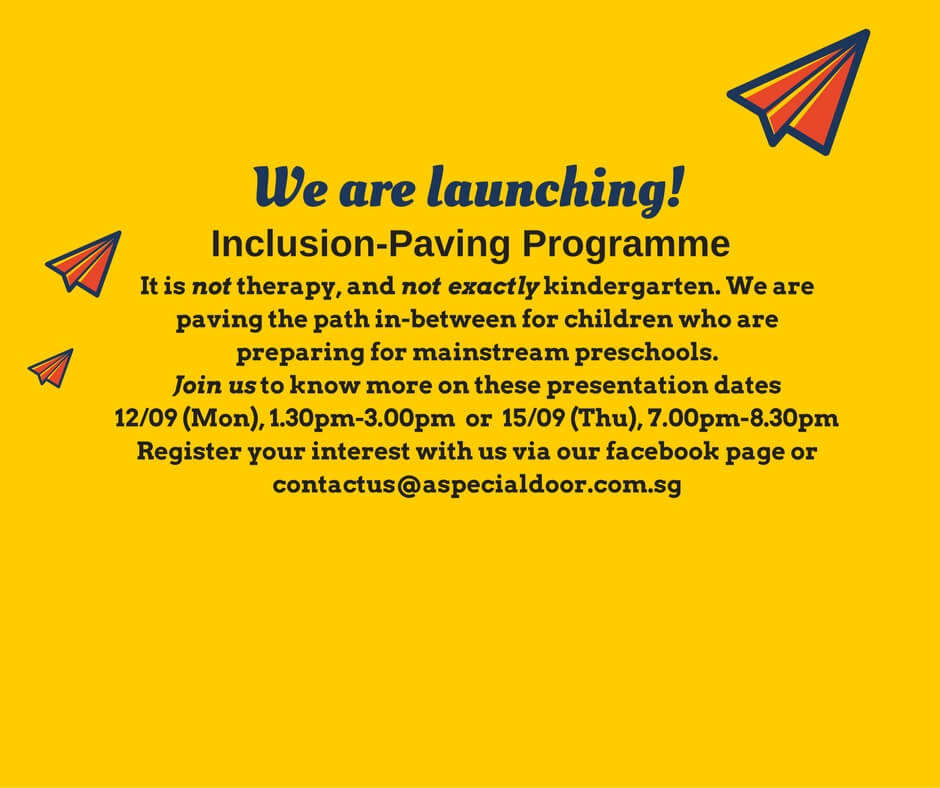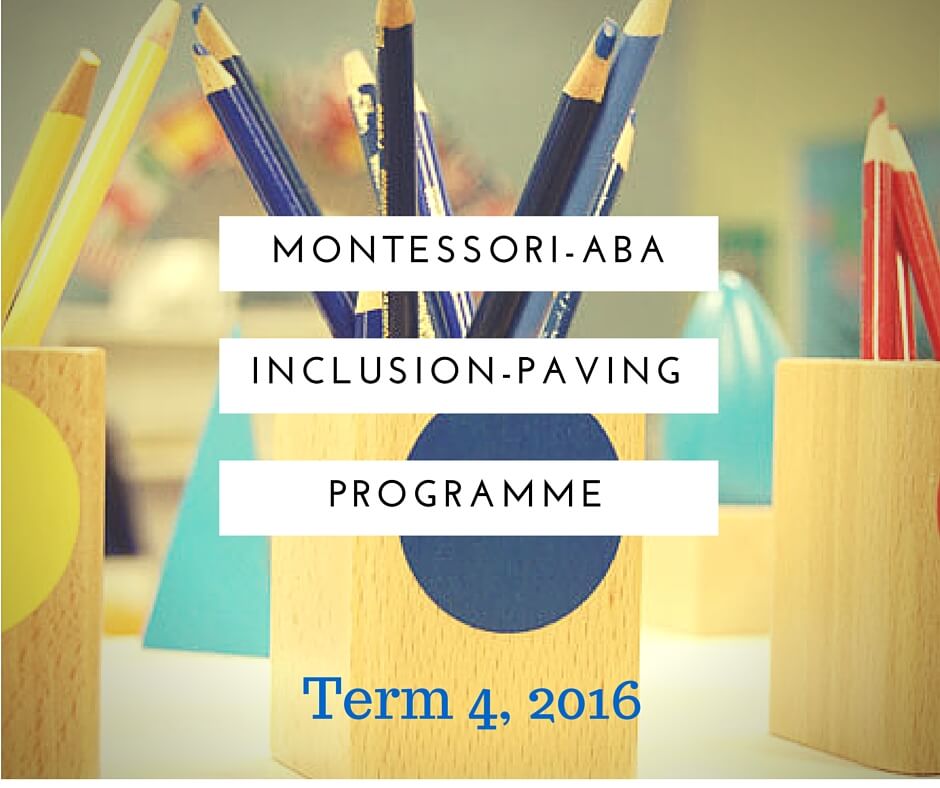Bulletin

1472642410000
Inclusion-Paving Prog soft launch
"Is my child ready for inclusion?""Maybe we should get a shadow teacher?""We should probably work on his social skills and attention...""Is there another option while waiting for EIPIC?" Parents and caregivers of a child with special needs, we hear you. Based on, and inspired by our experience in both 1:1 therapy and shadow support, we are proud and excited to offer the Inclusion-Paving Programme for children with special learning needs, between the developmental age of 3 and 6. Inaugural Term: October 10 - December 2 (8 weeks)Programme runs Monday - Friday, 2.30pm - 5.30pm(Options of 3-days/week or 5-days/week)Venue: 279 Bishan Street 24 More details at our programme presentations! Join us on Sept 12 (Mon), 1.30pm - 3.00pm or Sept 15 (Thu), 7.00pm - 8.30pm. Use our contact form or email us contactus@aspecialdoor.com.sg

1470311026000
Inclusion Paving Programme (IPP)
What it is... Our Inclusion-Paving Programme (IPP) is a programme uniquely designed to bridge the skills gap between EIP or 1:1 therapy and inclusive learning. Why the need? Essential skills, e.g. joint attention, social referencing, self-management are lacking in many students who, otherwise, would be ready for inclusive learning environment. Why Montessori? The Montessori method was developed in early 1900s by Maria Montessori, based on observations of children with special learning needs. It emphasizes a structured learning environment in which absorbent learning can happen and children feel competent in their own abilities. Why ABA (Applied Behavior Analysis)? ABA is the most widely researched approach to behavior modification. ABA principles and techniques have been proven to be effective in teaching and modifying behavior of children with special needs. Who can benefit from this programme? This programme is a 'small-step' progression from early intervention programme (EIP), in the leap to a kindergarten syllabus. It is designed with children of the following profile in mind:- with notable developmental delay, specifically in language; but otherwise, able to function with minimal behavior challenges- with developmental delays across domains, and receiving early intervention or therapy; but making steady progress and might be ready for inclusive learning- made significant gains from early intervention or therapy and ready for inclusion in a mainstream environment; but require a transition period to harness acquired skills and increase social confidence If you are interested to find out more about our IPP, or can already see how your child can benefit from this, wait no more! Get in touch with us!

1469707200000
Inclusion matters
"Inclusion is not about physical proximity. It is about intentionally planning for the success of all students." - thinkinclusive.us I started providing shadow support service for my students on intervention programme, in 2012. Since then, I have been a shadow teacher for students in local preschools, an international kindergarten, local primary schools and international schools (elementary level). In all honesty, I enjoy being a shadow support. The opportunity to interact with neuro-typical students, alongside my student, offers plenty of new perspectives to the art of teaching. The dynamics of a typical mainstream classroom constantly keep me on my toes as there is always something new to consider, to prepare for, to adjust to, all within the scope of supporting my student in an environment that can be rather chaotic . It is through experiencing that one can begin to form opinions and viewpoints that are more grounded in reality and thus, more meaningful and constructive. This, at least, is how I feel about inclusive education. In the bigger scheme of things (I'm thinking policies, governmental plans, big industry players, etc), much is being done to promote inclusion and to cultivate an inclusive society here. It is nowhere near ideal, but it is beginning - that is important. Still, parents I work with tell me how difficult it is to find a preschool that is willing to admit their child with special needs. The truth is, even though some preschool teachers have gone through training in special needs (mostly theoretical), they don't feel equipped nor confident of taking charge of a student with special needs, plus up to 12 other junior personalities, in their class. Surely then, it is understandable that preschools find it beyond them to welcome students with special needs. Even so. Let's say, a child has been successfully included in the class list of a K1 class. More questions start to unravel. - Is he/she able to follow the routines and understand the rules (Work habits and self-regulation)? - Is he/she able to perceive and play with peers (social and communicative behavior)? - Can he/she engage with the teacher in group learning (joint attention and referencing)? - Does he/she know when helped is needed and how to get help (functional communication)?- Does he/she need help in feeding, toileting, taking off and putting on shoes (self-help skills)?- Is he/she able to execute tasks, like writing, colouring, drawing (fine motor and motor coordination)? ... and how about the other students? How do they perceive and try to get along with him/her? There is really no easy answer to any of these questions. But, definitely worth a think, before we start scrambling preschool to preschool, hunting for a place that would accept our special child, and getting too caught up with 'including' him/her in what we call 'a mainstream environment'. Children with special needs do not learn naturally through being with other children. They are certainly capable of learning, but they do not learn and start to behave like other children just cos they are being surrounded by them. Including them in a whole class of neuro-typical children is merely 'inclusion' in the physical proximity. It doesn't do as much for them as parents would like it to. There is a whole set of skills expected from a child before inclusion can happen. Let us, then, be realistic and proactive in planning for successful inclusion, instead of expending energy and resources on enrolling the special child into learning environments that are not ready for them, or that they are just not ready for. First posted on our facebook page, on 19 Jan 2016

Enter your text here
Enter your text here
Enter your text here
Enter your text here